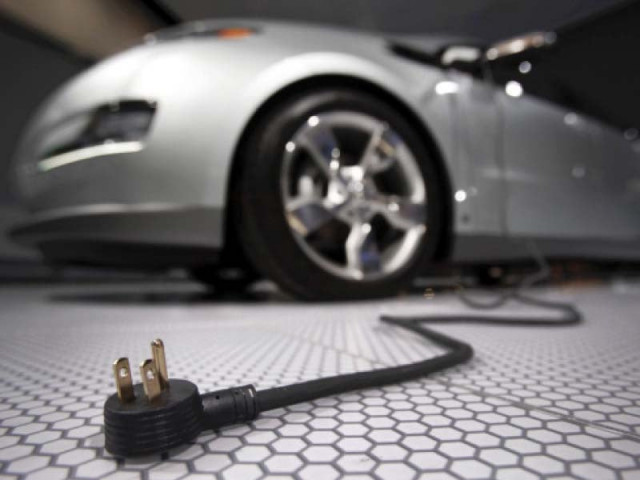Can Pakistan capitalise on the EV boom?
Inviting Chinese manufacturers, nurturing local EV ecosystem can position Pakistan on global map

In 2011, Elon Musk, Co-Founder, and CEO of Tesla, laughed at the prospects of China’s BYD effectively competing with his company in the electric vehicle (EV) market. Now, BYD has surpassed Tesla, becoming the leading seller of battery-only vehicles. In the final quarter of 2023, BYD sold 41,500 more cars than its American rival. This reflects the major shifts occurring in the global EV industry, highlighting the need for Pakistani policymakers to recognise and leverage these trends for economic advantage.
Pakistan has long faced financial challenges, notably a significant trade imbalance that burdens its economy. In the second half of 2023, Pakistan’s imports of goods exceeded exports by $11.3 billion, data from the Pakistan Bureau of Statistics show. A substantial portion of this trade deficit stems from the costly imports of energy products, including crude oil, liquid fuels like petrol and diesel, LPG, and LNG.
Pakistan’s limited domestic crude oil production meets only 15% of its demand and leads to heavy reliance on imports. Rising population and urbanisation are increasing energy needs, particularly in the transportation sector. However, the shift towards EVs could mitigate some of the energy import requirements, besides offering notable environmental benefits.
The global EV market has surged in the last three years, with the US, China, South Korea, Japan, and European nations experiencing rapid growth. BloombergNEF projects a 21% increase in EV sales in 2024 to 16.7 million units, with EVs representing one-fifth of all cars sold this year. However, Pakistan has yet to contribute to this boom. High-end EVs from Tesla or BYD remain out of reach for most Pakistanis, with limited availability due to no official presence and steep prices.
Despite this, the evolving landscape of the EV market could favour Pakistan. Although EV sales in the developed world are growing, they’re not as strong as initially anticipated, which could be due to potential market saturation and consumer hesitancy amid tough economic conditions. With increased competition and price cuts from giants like Tesla and BYD to boost sales, EVs may become more accessible worldwide. This shift offers Pakistan an opportunity to bring affordable EVs into its market.
Read: Tesla plans to build new electric vehicles in mid-2025
Pakistan, positioned right next to China—the epicentre of the world’s EV market forecasted to represent 60% of global EV sales in 2024—has a strategic opportunity to dive into the EV boom. China’s burgeoning EV scene is getting crowded with both traditional automakers like GAC Motor and new entrants like the tech giants Huawei and Xiaomi, which are launching their own EV models. Amid intensifying competition, many Chinese companies, including BYD, are eyeing global expansion, offering Pakistan an opportunity to draw in these EV pioneers.
Note that the Government of Pakistan’s National Electric Vehicle Policy, launched in 2019, set ambitious targets: by 2030, EVs should make up 30% of new car and heavy truck sales, and 50% of sales for two-wheelers, three-wheelers, and buses. However, progress towards these goals has been sluggish, with EVs barely making their mark in overall vehicle sales.
A handful of Pakistani companies have ventured into the EV space, hinting at potential demand, especially in the two and three-wheeler segments. Yet, the government’s actions have fallen short of the policy’s aspirations. None of the major Chinese EV makers are present in the country, and local investors have been hesitant to fully commit without clear, supportive measures from the government.
To accelerate growth, Pakistan should offer better, long-term-oriented incentives that include tax breaks for investors, affordable financing options for EV buyers, and subsidies for manufacturers to establish assembly and production facilities locally, alongside developing the requisite charging infrastructure. The government must also work with the private sector to establish vocational training centres to cultivate a skilled workforce that is crucial for the local EV industry’s development.
By inviting Chinese EV manufacturers to Pakistan and nurturing a local EV ecosystem, policymakers can position Pakistan on the global map of sustainable mobility.
To decisively slash Pakistan’s energy imports, the government must adopt a comprehensive strategy that goes beyond the EV space. It’s imperative to boost local refinery operations as well to their utmost potential, aiming for a utilisation rate above 90% from the current near 60%. Such an enhancement in refinery productivity would increase the volume of domestically produced fuels, cutting reliance on expensive imported petrol and diesel.
Moreover, revitalising the faltering oil and gas exploration and production sector is crucial. This sector has been marred by dwindling foreign investment and a steady decline in production. Equally important is the push towards renewable energy initiatives, aiming for a transition from fossil fuels to cleaner, sustainable sources for electricity generation. These steps represent a holistic commitment to redefining Pakistan’s energy narrative.
In short, the government must not only look inward but also outward, aligning with global trends to catalyse economic growth.
Such a holistic strategy requires more than just policy tweaks—it demands a bold commitment to innovation and a willingness to forge new paths in the face of traditional challenges. The pivotal question then arises: Do our policymakers possess the courage to embark on such transformative initiatives?
THE WRITER IS A CORPORATE CONSULTANT SPECIALIZING IN BUSINESS AND ECONOMIC ISSUES
Published in The Express Tribune, February 5th, 2024.
Like Business on Facebook, follow @TribuneBiz on Twitter to stay informed and join in the conversation.



















COMMENTS
Comments are moderated and generally will be posted if they are on-topic and not abusive.
For more information, please see our Comments FAQ